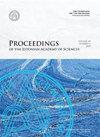苏联时期爱沙尼亚及转型时期护士的专业活动与工作文化
IF 0.7
4区 综合性期刊
Q3 MULTIDISCIPLINARY SCIENCES
引用次数: 0
摘要
. 本定性研究旨在从高级护士的角度分析苏联时期和90年代过渡时期爱沙尼亚护士的专业活动和工作文化。在1940-1941年和1944-1991年,爱沙尼亚共和国的领土被苏俄占领。戈尔巴乔夫的改革开放(1985-1991)开启了“新觉醒时期”,导致了民主化。1991年苏联解体后,爱沙尼亚就开始按照欧洲标准建立新的医疗体系。该研究是在2021年和2022年进行的。调查对象为在苏联时期工作至少20年、在过渡时期工作至少5年的老年护士(年龄69 ~ 87岁)。以书面和口头形式(13名受访者)进行专题访谈,随后进行焦点小组访谈(8名受访者)。进行了专题内容分析。在苏联时期,护士的日常工作以恶劣的工作条件、等级森严的职业关系和悲惨的职业前景为特点。护理和许多其他领域一样,受到苏联意识形态的强烈影响。护士之间的关系是相互支持的。过渡时期造成了混乱局面- -前一时期的工作方法被认为是过时的,但尚未确定新的方向。通过专业培训和借鉴国外经验,提高了护士的知识水平。本文章由计算机程序翻译,如有差异,请以英文原文为准。
Nurses’ professional activity and work culture in Soviet Estonia and in the transition period
. The qualitative study aimed to analyse Estonian nurses’ professional activity and work culture during the Soviet era and the transition period of the 1990s from the perspective of senior nurses. In 1940–1941 and 1944–1991, the territory of the Republic of Estonia was occupied by Soviet Russia. The ‘new period of awakening’ was initiated under Gorbachev’s perestroika and glasnost (1985–1991), leading to democratisation. As soon as the Soviet Union collapsed in 1991, Estonia began to establish a new healthcare system based on European standards. The research was conducted in 2021 and 2022. Senior nurses (aged 69–87) who had worked for at least 20 years during the Soviet era and at least 5 years during the transition period were surveyed. Thematic interviews were conducted in written form and orally (13 interviewees), followed by a focus group interview (8 interviewees). A thematic content analysis was performed. Nurses’ daily work during the Soviet era was characterised by poor working conditions, hierarchical professional relations, and miserable career prospects. Nursing, like many other fields, was strongly influenced by Soviet ideology. The relationship between nurses was mutually supportive. The period of transition created a chaotic situation – the working methods of the previous period were considered outdated, but no new direction had yet been established. Nurses’ knowledge was improved through professional training and access to foreign experience.
求助全文
通过发布文献求助,成功后即可免费获取论文全文。
去求助
来源期刊

Proceedings of the Estonian Academy of Sciences
综合性期刊-综合性期刊
CiteScore
1.80
自引率
22.20%
发文量
24
审稿时长
>12 weeks
期刊介绍:
The Proceedings of the Estonian Academy of Sciences is an international scientific open access journal published by the Estonian Academy of Sciences in collaboration with the University of Tartu, Tallinn University of Technology, Tallinn University, and the Estonian University of Life Sciences.
The journal publishes primary research and review papers in the English language. All articles are provided with short Estonian summaries.
All papers to be published in the journal are peer reviewed internationally.
The journal is open to word-wide scientific community for publications in all fields of science represented at the Estonian Academy of Sciences and having certain connection with our part of the world, North Europe and the Baltic area in particular.
 求助内容:
求助内容: 应助结果提醒方式:
应助结果提醒方式:


